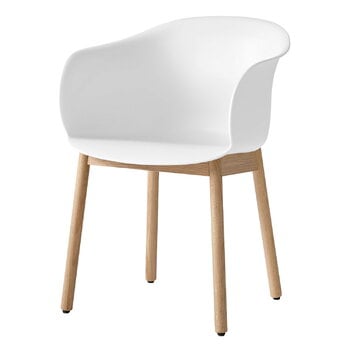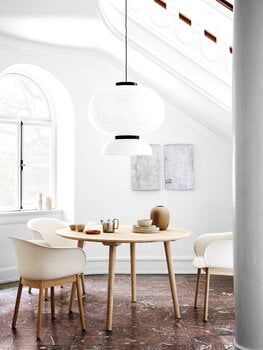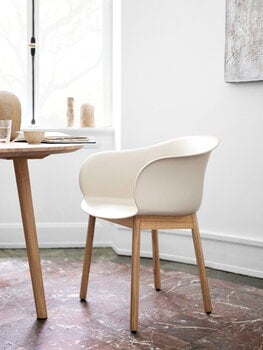The Elefy chair by &Tradition, with its rounded shape and humorous name, was inspired by elephants. The generous seat is supported by sturdy legs, and the softly curved armrests are reminiscent of an elephant’s ears. The attractive chairs have been designed with comfort in mind: the designer Jaime Hayón wanted to create a chair that would envelop the sitter from all sides, generating a cosy sense of warmth and wellbeing. The Elefy chair is designed to be used in various spaces, and it fits particularly well around a dining or conference table.
Elefy JH30 chair, white - oak
&Tradition
Description
The Elefy chair by &Tradition, with its rounded shape and humorous name, was inspired by elephants. The generous seat is supported by sturdy legs, and the softly curved armrests are reminiscent of an elephant’s ears. The attractive chairs have been designed with comfort in mind: the designer Jaime Hayón wanted to create a chair that would envelop the sitter from all sides, generating a cosy sense of warmth and wellbeing. The Elefy chair is designed to be used in various spaces, and it fits particularly well around a dining or conference table.
Product details (10)
- Colour
- White, oak
- Width
- 57.5 cm
- Depth
- 58 cm
- Height
- 77 cm
- Seat height
- 47 cm
- Material
- Polypropylene, solid wood, veneer
- Seat material
- Moulded polypropylene
- Base material
- Lacquered solid wood, form pressed veneer
- Weight
- 7.8 kg
- Notes
- Felt gliders installed as standard.
- Product ID
Designer
Jaime Hayón (b. 1974) grew up in Madrid where he got influenced by the local culture of skateboarding and graffiti painting. He studied industrial design in Madrid and later on in Paris. In 2001 he founded his own studio where and since then he has developed to a acknowledged designer. His works have been noted globally in distinguished medias. Hayón has worked for several companies including Magis, &Tradition, Fritz Hansen and Swarovski. Today Hayón has offices in Italy as well as in Spain and Japan.
View all productsReviews (0)
Sustainability
The Product Sustainability Framework, our criteria of sustainable design, helps you find the most sustainable products in our selection. Read below which sustainability criteria this product has met.
Working conditions & labour 8/9
-
Equal opportunities for all employees
-
Commitment to UN Global Compact, fair compensation for all employees
-
Corporate responsibility requirements defined and communicated for suppliers
-
Systematic work for improved inclusion and well-being in the workplace
-
Transparent supply chain
-
Suppliers' compliance to a code of conduct ensured
-
Direct suppliers audited and certified
-
Compliance to the UN Guiding Principles on Business and Human Rights ensured in the supply chain
-
Support for community involvement in the supply chain
Eco-friendly production 6/9
-
Fair and resource-wise water-use in production
-
No incineration or landfilling of returned items
-
No use of endangered species as materials
-
No direct environmental emissions or waste (excl. GHGs) from production
-
Material-efficient and ecological packaging
-
No potentially harmful chemicals used in own production
-
The sustainability of direct suppliers' production is addressed and monitored
-
Production and material sourcing that respect biodiversity, animal rights, and natural ecosystems
-
Positive impact on nature’s well-being through operations that regenerate natural ecosystems
Climate impact 5/8
-
Company's direct greenhouse gas emissions identified and commitment to reduction
-
Product's carbon impact identified and commitment to reduction
-
Guidance on energy- and eco-efficient use of the product
-
Contribution to climate initiatives beyond the brand’s direct operations
-
100 % renewable energy in own production and operations
-
Low-carbon or compensated transportation
-
Carbon footprint of the product calculated and goals set to reduce it
-
Carbon neutral or carbon negative product
Sustainable materials 3/6
-
Sustainable and long-lasting material choices
-
No harmful or hazardous substances
-
Responsible raw material sourcing and production
-
Materials suited for circularity: monomaterials, recyclable finishings, renewable or recycled contents etc.
-
Ecological materials: natural, biodegradable, recyclable or recycled contents
-
Outstanding materials in terms of innovativeness, responsibility, sustainability and circularity: local production or sourcing, 100 % recycled content, C2C-certification etc.
Circular design 4/5
-
High aesthetic quality promoting long-term use of the product
-
Technically durable product design and material choices
-
Design for enduring life-long quality
-
Design and support for product maintenance, repair and upgradability
-
Innovative circular design solutions: circular service system, resale platform, remanufacturing, collection of used products, etc.










